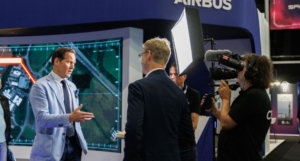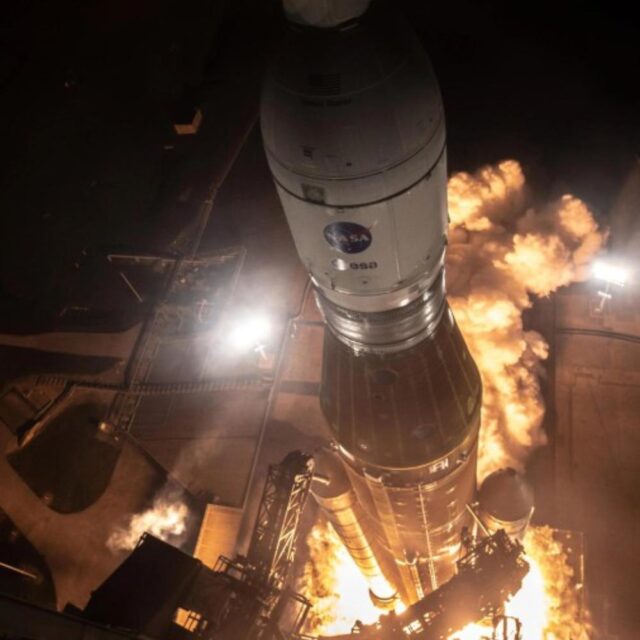Excitement builds as registrations roll in for Farnborough International Space Show 2025

October 31, 2024

With registrations breaking records for the Farnborough International Space Show, Aerospace Global News caught up with Joe Muir, Aerospace Commercial Director at Farnborough International, to find out what visitors can expect.
Describing the trend being seen in the global space sector as “truly exciting”, Muir underlined that the focus for the show (which will take place 19-20 March next year) is on increasing international collaboration and to create a comprehensive gathering in the UK for the entire global space community to come together in one place. “By hosting such events, we’re working toward a truly all-encompassing representation of every sector within the space industry,” he said.
With the most registrations within 24 hours for any launch in Farnborough’s history, the show is already breaking records and on track to achieve its goals.
Space clusters
The event will feature three theatres with panel sessions and keynote presentations covering topics including commercial space operations, manufacturing sustainability, space security and defence, as well as space exploration. One of the most critical themes will be Earth observation, an area that’s become increasingly important due to the significant data it provides on global environmental challenges and changes, according to Muir.
 There are also up to 200 exhibitors expected with leading organisations that have already signed up including Viasat, Lockheed Martin, L3Harris, Airbus and the Global Spaceport Alliance. Muir also explained that a key feature at the show is the “space clusters”, which enable multiple companies to exhibit as a collective on one larger stand “much like the pavilions at Farnborough Airshow.” This approach “allows smaller companies to participate under a larger banner, promoting a mix of industry leaders and up-and-coming enterprises.”
There are also up to 200 exhibitors expected with leading organisations that have already signed up including Viasat, Lockheed Martin, L3Harris, Airbus and the Global Spaceport Alliance. Muir also explained that a key feature at the show is the “space clusters”, which enable multiple companies to exhibit as a collective on one larger stand “much like the pavilions at Farnborough Airshow.” This approach “allows smaller companies to participate under a larger banner, promoting a mix of industry leaders and up-and-coming enterprises.”
He added that this kind of interaction between major corporations, smaller companies and public entities can foster “new collaborations, drive policy discussions and potentially lead to groundbreaking advancements in space technology.”
One of UK’s largest gatherings of the space community
To boost international representation at the show Farnborough International announced earlier this year that it would be co-locating the Space Show with the 40th International Symposium on Remote Sensoring of the Environment (ISRSE-40). Having two major shows co-located like this marks one of the UK’s largest gatherings of the space community, with an anticipated audience of 700 to 800 delegates per day at the remote sensoring symposium.
“This collaboration marks the first time this symposium is being held in the UK, bringing with it a large international audience, including space agencies and academic experts, encompassing the full scope of space research, from upstream data collection to downstream applications and innovations,” noted Muir.
“This decision ensures that we can integrate the entire ecosystem in a single location, bridging both commercial and academic perspectives, while making strides towards a more robust and collaborative future for space exploration.”
Government participation
With the UK’s Secretary of State for Science, Innovation and Technology, Peter Kyle confirming his participation at the Space Show and recent discussions in the House of Commons highlighting space as a key growth sector for the economy, Muir also pointed to the UK Government Hub, as an integral feature of the inaugural event. “With the UK positioning itself as a central player in the ongoing conversations about space and establishing itself as a valuable contributor to the global industry, this visibility and support will also benefit UK PLCs helping the country attract investments and partnerships.”
Muir revealed that the Government Hub will be a physical manifestation of the government at the show, acting as a central space for UK government representation. It will also provide a structured space for high-level policy discussions, enabling officials to engage with industry leaders and stakeholders on matters that will shape the future of space exploration. Although not confirmed, the organisers are also working on introducing an international government hub.
Another key feature of the event is the focus on encouraging dialogue between investors and startups. “Based on our success at Farnborough in facilitating business connections, we’re committed to embedding similar opportunities into every aspect of the show through our dedicated Launch Pad, Investor Centre and Business Connections Exchange areas.” The idea is to create a setting where business development is a core focus, but not solely on major industry players. Support for small- to medium-sized enterprises (SMEs) is also a priority, especially given the crucial role they play in driving innovation. With Farnborough International’s parent company, ADS, a membership organisation that values the contributions of SMEs, Muir added “we’re intent on ensuring these smaller companies as well the industry giants find meaningful opportunities.”
Rise of small satellites
Looking ahead, Muir underlined that some of the most promising areas for growth in the commercial space sector include satellite services, space mining, and tourism. “Space tourism, in particular, is attracting significant attention, with companies like SpaceX and Virgin Galactic driving public interest,” he said.
However, for Muir the growth of small satellites (SmallSats) stands out as particularly exciting. “They are revolutionising the industry due to their lower launch costs and versatility. SmallSats cater to both civilian and military applications, highlighting the strategic importance of this sector. The increased deployment of these satellites opens up possibilities for advancements in global communication, environmental monitoring and defence operations, so this is definitely an exciting space to watch.”
Space for collaboration
A key theme that ties all these areas together is collaboration. “The success of future space endeavours will rely heavily on partnerships between private companies, government agencies, and research institutions. Collaboration is critical not only for technological innovation but also for addressing the regulatory and ethical challenges of space exploration and utilisation.
“Ultimately, the hope for this event is to catalyse meaningful progress in the space sector. By bringing together a diverse international audience, we’re creating a platform that doesn’t just facilitate discussions but also drives action. Often, events generate a lot of discussion but little concrete outcome. Our goal is for this gathering to be a turning point, sparking growth not only for the UK but also for the international space industry.”
















